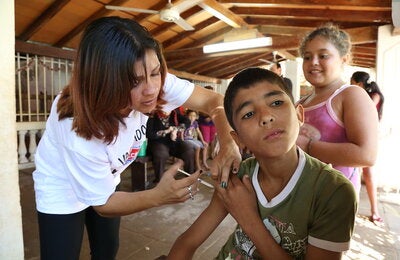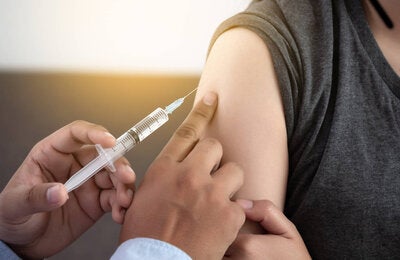Washington, D.C., 20 September 2018 (PAHO/WHO) – A telemedicine initiative in the Gracias a Dios department of Honduras, along with two programs to control Chagas disease in Comapa, Guatemala, have been recognized for their innovative community-based approach to improving health. The recognition came from a partnership of international organizations seeking high-impact examples of social innovation in health from around the world.
The objective was to identify initiatives offering community-based solutions and responses to the problems posed by infectious diseases in Central America and the Caribbean and to highlight projects in social innovation that are providing solutions to health problems through more inclusive, effective, and affordable health services. By empowering initiatives that help mitigate the effects of unequal access to quality medical services, others may be inspired to develop, replicate, or adapt social innovations in health.
The three projects selected for recognition in 2018 were:
MosquitiaMed: In La Mosquitia, in the Honduran department of Gracias a Dios, a group of doctors has been implementing a series of health interventions that use technology to improve access to health for a population that is accessible only by air or water. MosquitiaMed works through educational programs in rural areas to promote solutions to simple health problems at the community level. The initiative has developed videos on health topics in the local indigenous language, making use of cell phone service to disseminate the content. It has also created a telemedicine app for mobile devices that allows people to consult various specialists based in Tegucigalpa, the country’s capital.
By the end of 2017 the initiative had reached some 2,800 children with its nutritional program; approximately 2,500 patients participated in health brigades in the area’s communities and towns; and more than 600 community leaders received training in health promotion. Some 350 people used the telemedicine app to consult physicians, resulting in 20 patients being transported outside the area for specialized medical care. For more information on this initiative, see: MosquitiaMed (Honduras)
Community-based strategies to prevent Chagas disease in rural areas: An interdisciplinary group, brought together by researchers at Universidad del Valle, in Guatemala, implemented a project in the municipality of Comapa designed to reduce the likelihood of homes being re-infested by the vector of Chagas disease, by providing the community with tools for managing the animals on which the vector feeds. The initiative also sought to improve diagnosis and treatment of patients with Chagas disease at the Comapa Health Center. In addition, the program has helped reduce mother-to-child transmission of the disease, using a strategy that could also prove effective in preventing transmission of the Zika virus.
The project improved interactions between the municipality, which is responsible for vector control, and the Comapa Health Center.
Ecohealth approach for control of the Chagas disease vector: In Comapa, Guatemala, a project initiated by the Entomology and Parasitology Laboratory of the University of San Carlos identified risk factors that led to the infestation of houses by the vector that transmits Chagas disease. Three of these factors were associated with the quality of floors and walls, and the presence of animals inside homes. The program worked with the community to determine the best way of filling the cracks where the vectors can lodge, using locally available materials and employing techniques culturally appropriate to the community. The project also sought to increase awareness about the health hazards associated with this disease. Community leaders were trained on how to improve their own homes and implement healthy ways of managing their animals.
This project led to positive changes in the community, in terms of both culture and behavior, thus increasing the ability to prevent Chagas disease. This ecohealth approach has been replicated in other Central American countries. For more information on this initiative, see: Ecohealth approach for the control of native vectors of Chagas disease (Guatemala)
The three projects described above were selected by an international jury composed of representatives from the International Federation of Medical Students’ Associations; the World Bank’s Division of Health, Nutrition, and Population Data and Statistics; Paraguay’s Center for the Development of Scientific Research; Universidad del Valle (Guatemala); Colfuturo (Colombia); the United States Department of Health and Human Services; the Inter-American Development Bank; and Alternative Health, an organization in Cameroon. Jury members evaluated only projects that posed no conflict of interest for them. The criteria used included: relevance of the solution to the problem, degree of innovation, community inclusion, effectiveness, affordability, and potential for replication elsewhere in the world.
In Central America and the Caribbean, as in other regions of the world, thousands of people lack access to affordable quality health care. While the necessary health workers, drugs, vaccines, and medical devices do not always reach those who need them, communities in the countries of this region are finding solutions to strengthen health care and make it affordable for the population.
The selected projects will be a source of inspiration for other communities, innovators, and institutions interested in advancing knowledge in this field. Each project presented a case study of its innovative solution and these have been published on the Social Innovation in Health Initiative (SIHI) website. SIHI is a global collaboration of partners seeking to identify, highlight, and advance innovative community solutions in health andrelated to research. PAHO and its partners are members of this partnership, which in 2015 identified 23 high-impact examples of social innovation in health in 15 countries, two of them in the Americas.



